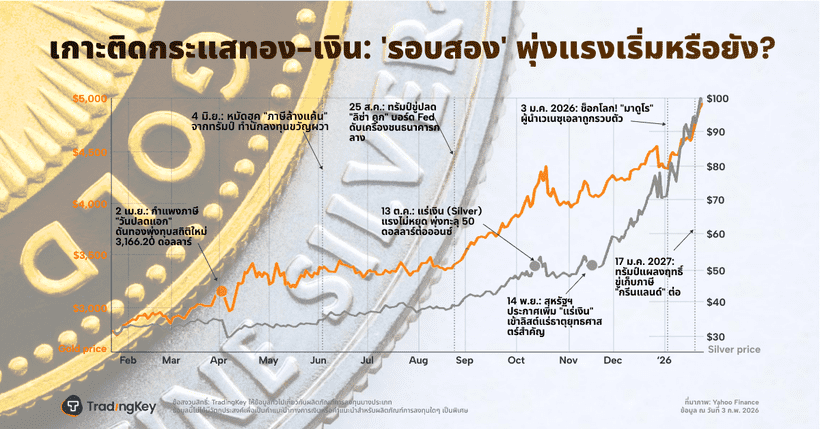ตลาดการเงินขาดความเชื่อมั่นในความสามารถของ BoE ในการควบคุมอัตราเงินเฟ้อ

ตามรายงานของ Financial Times ธนาคารแห่งอังกฤษ (BoE) เผชิญกับข้อสงสัยจากตลาดการเงินเกี่ยวกับความสามารถในการบรรลุเป้าหมายเงินเฟ้อที่ 2% รายงานเปิดเผยว่าแม้ว่าตัวเลขจริงจากธนาคารกลางของสหราชอาณาจักรจะแสดงความคืบหน้าเชิงบวกในการควบคุมอัตราเงินเฟ้อ แต่ตลาดการเงินยังคงไม่มั่นใจกับการคาดการณ์อย่างเป็นทางการของ BoE
เมื่อปีที่แล้ว BoE คาดการณ์ว่าอัตราเงินเฟ้อจะอยู่ที่ 3% เนื่องจากทั้งอัตราดอกเบี้ยและการว่างงานยังคงอยู่เหนือ 5% ภายในสิ้นปี 2567 อย่างไรก็ตาม สถานการณ์กลับกลายเป็นเชิงบวกมากขึ้น เนื่องจากรายงานเปิดเผยว่าอัตราเงินเฟ้อผ่อนคลายลงใกล้กับเป้าหมาย 2% ในขณะที่อัตราดอกเบี้ยลดลงเหลือ 4.75% และการว่างงานอยู่ในระดับต่ำที่ 4.3%
BoE ต่อสู้กับข้อสงสัยของตลาดท่ามกลางแรงกดดันด้านเงินเฟ้ออย่างต่อเนื่อง
ตลาดการเงินในสหราชอาณาจักรไม่คาดว่า BoE จะบรรลุเป้าหมายเงินเฟ้อที่ 2%
นั่นถือเป็นเรื่องผิดปกติในระดับสากล
พวกเขาคาดว่าอัตราเงินเฟ้อจะเฉลี่ย 3% ในอีก 50 ปีข้างหน้า….
…เกิดอะไรขึ้น?
https://t.co/QBLYhH9g6T ล่าสุดของฉัน
ลงทะเบียน https://t.co/9W1LiN2e7a pic.twitter.com/S0KtPvinOu
— คริส ไจล์ส (@ChrisGiles_) 26 พฤศจิกายน 2024
Clare Lombardelli, the BoE’s deputy governor for monetary policy, gave a speech yesterday at the annual BoE watchers’ conference seeking to address issues about the central bank’s credibility, policy, and forecasting. However, her speech gave several explanations for the market’s persistent belief in higher UK inflation, including doubt about RPI change.
Despite the seemingly good inflationary outcome, Lombardelli declared it was too early to declare victory on inflation. She noted that the outlook on salaries and services inflation was ‘unclear from here’ because the pace of wage growth was not slowing as much as expected.
Lombardelli warned the conference that a scenario in which companies and workers get used to wage rises of 3.5% to 4% and price inflation of 3% would be more costly to change if it becomes entrenched. However, the National Institute of Economic and Social Research think tank predicted that inflation in the UK could rise to 3% in 2025.
“But at this point, I am more worried about the possible consequences if the upside materialised, as this could require a more costly monetary policy response.”
– Clare Lombardelli
Lombardelli said that she supported the gradual removal of monetary policy restrictions and would be monitoring the flow of data over the coming months so that the BoE could calibrate its policy path as needed.
Lombardelli addresses market doubts as other experts weigh in on the UK’s economic outlook
Lombardelli acknowledged the financial markets’ concerns and said the BoE was working to improve its forecasting models. While she admitted that the BoE’s efforts to improve its models were ongoing, Lombardelli confirmed that the changes in how the UK’s central bank predicted the future would be huge.
She expressed a ‘hawkish’ view on inflation, suggesting that the risks of inflation lasting for too long outweighed the risks of lower inflation. Her colleague on the monetary policy committee, Swati Dhingra, shared most of her sentiments but viewed the risks differently.
Overall, Lombardelli disclosed that the BoE was planning to gradually reduce its monetary policy until it had more information about inflation’s behavior. She also outlined the central bank’s plan to implement reforms suggested by Ben Bernanke, a former U.S. Fed chair and Nobel Prize winner.
Ian Harnett, chief investment strategist at Absolute Strategy Research, argued that central banks should aim to bring inflation down after periods of high inflation. DeAnne Julius, former UK monetary policy committee member, emphasized that the UK could face stagflation since the general economic outlook was more pessimistic.
Martin Sandbu argued that Europe needed to save less and suggested different policy changes to achieve this. He pointed out that many of the suggested policy changes were unpopular with the BoE.
From Zero to Web3 Pro: Your 90-Day Career Launch Plan







